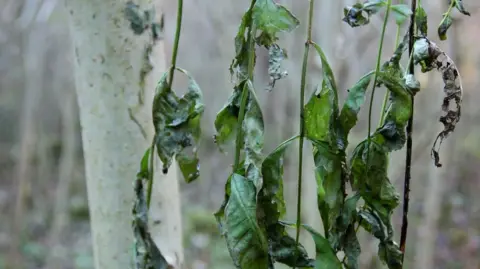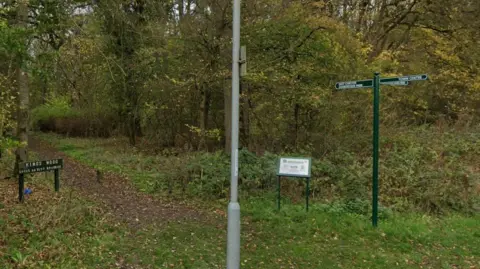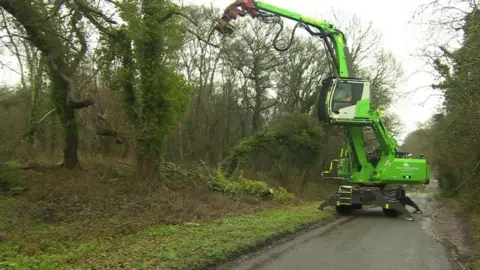More trees to be felled in battle against disease
 PA Media
PA MediaMore trees are to be felled in public parks as a council battles against a fatal disease.
About 35 trees will be removed from parks run by North Northamptonshire Council to combat ash dieback this winter.
The council said there would be no mass fellings and only infected trees would go.
The disease is expected to kill many of the country's ash trees.
Ash dieback originated in eastern Asia but spread to Europe about 30 years ago.
Asian ash trees have developed good resistance to the disease, but European specimens have no natural defence.
It is caused by a fungus that spreads through the leaves or the trunk of a tree and blocks its nutrient and water transport systems.
North Northamptonshire Council said that, instead of mass felling, it would be "taking a considered approach, removing individual, infected trees from King's Wood Local Nature Reserve, Irchester Country Park and East Carlton Countryside Park".
 Google
GoogleIt added that work started on the project last year and most of the 35 trees due to be felled this year would come from the King's Wood reserve in Corby.
Some of the timber will be used to create habitats, while the rest will be turned into firewood to create income for the parks and woodland service.
The authority said any trees that posed a safety risk by footpaths, roads and houses would be removed as a priority.
It added: "By removing these trees, sunlight will be able to reach the woodland floor, encouraging new growth of flowers and other vegetation, which will support butterflies and other invertebrates.
"Doing this will not only make the woodland safer, but it will also make it more diverse and encourage a wider variety of wildlife into the area."

Harriet Pentland, the council's executive member for climate and green environment, said: "Without carefully managed removal of certain infected trees, there is the very real risk that these will fall of their own accord, causing damage to nearby trees and residential properties or injury to the public.
"We have an extensive tree planting programme in North Northamptonshire where over the past three years we have planted about 10,000 trees annually, including whips and standards, with a further 10,000 planned for this coming winter."
Follow Northamptonshire news on BBC Sounds, Facebook, Instagram and X.
